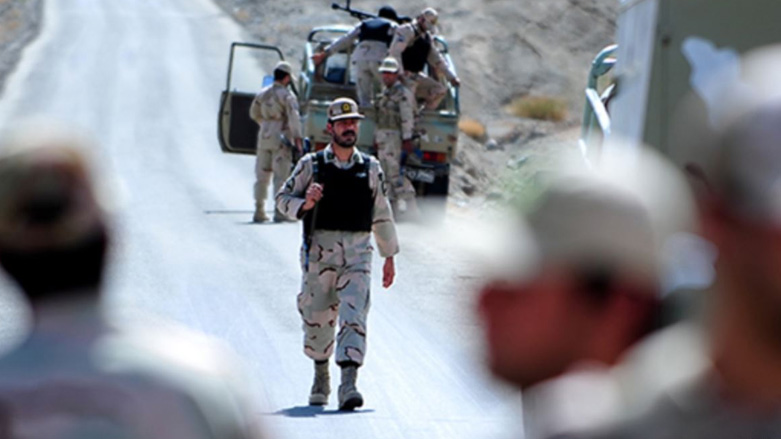Iran claims it ‘cleared’ border area of Kurdish fighters as violent clashes continue

ERBIL (Kurdistan 24) – A top Iranian commander on Wednesday claimed that the country’s armed forces had concluded a massive military operation and “cleared” an area close to the Iran-Iraq border of Kurdish opposition fighters.
The campaign began Tuesday and took place in an area between the Iranian province of Kurdistan known as the Chehel-Cheshme mountain range to the eastern border crossing with the Kurdistan Region of Iraq, according to Islamic Revolutionary Guard Corps (IRGC) Ground Forces Commander Mohammed Pakpour.
Iranian forces imposed a curfew on nearby rural Kurdish settlements and bombarded suspected positions of Kurdish fighters, one opposition group claimed.
The operation concluded “by achieving its stated aim,” Pakpour said in a statement released to Iranian media outlets.
The commander added that Iranian special forces, infantry, Air Force drones, and local IRGC forces participated in Tehran’s so-called “Martyrs of Muslim Kurds” operation against armed groups that have been fighting Iran for Kurdish rights and autonomy. Tehran designates such parties as “terrorist organizations.”
Areas surrounding the rough terrain of Chehel-Cheshme were the site of heavy clashes in early May, including attacks by Iranian Kurdish opposition groups and shelling by IRGC forces in response. On June 21, the armed wing of the Kurdistan Free Life Party (PJAK) claimed responsibility for taking active part in the engagement and killing three IRGC soldiers.
Read More: Iran Guard troops killed in new clashes with Kurdish opposition group: Monitor
“We warn the terrorist elements and their allies that in case of any mischief on the borders, especially in the northwest and southeast of the country, they will be met with an iron fist and a decisive response from the IRGC’s Ground Forces,” Pakpour asserted. The “southeast” is in reference to Sunni Baluchi militant groups mostly operating in the Baluchistan area of Iran.
Clashes Continue in the ‘Northeast’
As the IRGC was seeking out Kurdish fighters in Kurdistan province, multiple clashes erupted on Tuesday and Wednesday to the northwest of Chehel-Cheshme in West Azerbaijan province.
The first of these occurred near the Kuran village of West Azerbaijan near the Turkish border and reportedly involved Turkish forces as well as suspected members of the Kurdistan Workers’ Party (PKK), with which PJAK is affiliated. Since mid-June, Turkish forces have been engaged in an intense campaign against the PKK, especially inside the Kurdistan Region.
The Turkish defense ministry said on Wednesday that a Turkish army unit came under fire from Iran as they were conducting a mission. Two soldiers were reportedly wounded and another one killed. The Iranian foreign minister later confirmed the incident, saying that fighters of a “terrorist group” were behind the attack.
Abbas Mousavi, a spokesperson for Iran's foreign ministry said in a statement published by Iranian media that a mortar shell landed in its national territory during the clashes, but “luckily, did not lead to human casualties.” He added that “different dimensions of the incident are being investigated by border officials of both countries.”
In mid-June, Pakpour dismissed Turkish claims that PKK fighters were residing on the Iranian side of the border. While affirming “fruitful interactions” between Turkish and Iranian forces, he called on Ankara to consult Tehran through “official channels” on such issues before making public claims.
In March 2019, the Turkish army conducted a series of operations against PKK positions on the Turkey-Iran border. Ankara claimed these moves were in coordination with Iranian forces, but the IRGC denied any involvement.
In a separate confrontation on Wednesday, approximately 130 kilometers to the south of Kuran, another Kurdish opposition group, the Democratic Party of Iranian Kurdistan (PDKI), claimed in a statement that its fighters “forced” the retreat of an IRGC unit. The Iranian army “had planned to attack” a PDKI base in the Halgurd Mountain area on the Kurdistan Region-Iran border.
“The [PDKI] Peshmerga unit did not suffer any casualties,” the statement added.
Further abroad, a 64-year-old former leadership member of the PDKI survived an assassination attempt on Saturday in the Dutch city of Leeuwarden, an attack his family has blamed on the Iranian government.
Related Article: Kurdish Iranian politician survives assassination attempt in the Netherlands
In May, multiple clashes took place between Iranian forces and Kurdish opposition groups near the Iran-Kurdistan Region borders, leading to nearly a dozen casualties among IRGC troops and Iranian border guards.
In response, the Iranian military conducted several cross-border raids in purported efforts to target bases of Iranian Kurdish opposition parties. The PDKI later claimed that the IRGC attacks had struck its outposts, but reported there had been no casualties. Iraq summoned the Iranian envoy to protest the operations.
Previously, Iran has also struck outposts and bases of Kurdish opposition groups across its borders into the mountainous areas of the neighboring Kurdistan Region. Such operations by the Iranian government have also led to multiple civilian casualties in the Kurdistan Region in the past, including the killing a teenage girl in July.
Read More: Iran says IRGC killed 'large number' of fighters based in Kurdistan Region
In September 2018, the IRGC launched what it claimed was a cross-border operation in which it used land-to-land missiles across a 220-kilometer distance to target the headquarters of the PDKI and the Kurdistan Democratic Party-Iran (KDP-I), outside the town of Koya, in Erbil province.
The attack reportedly killed 15 and injured 42 more. That same day, Tehran also executed three Kurdish political prisoners on death row.
Editing by John J. Catherine
